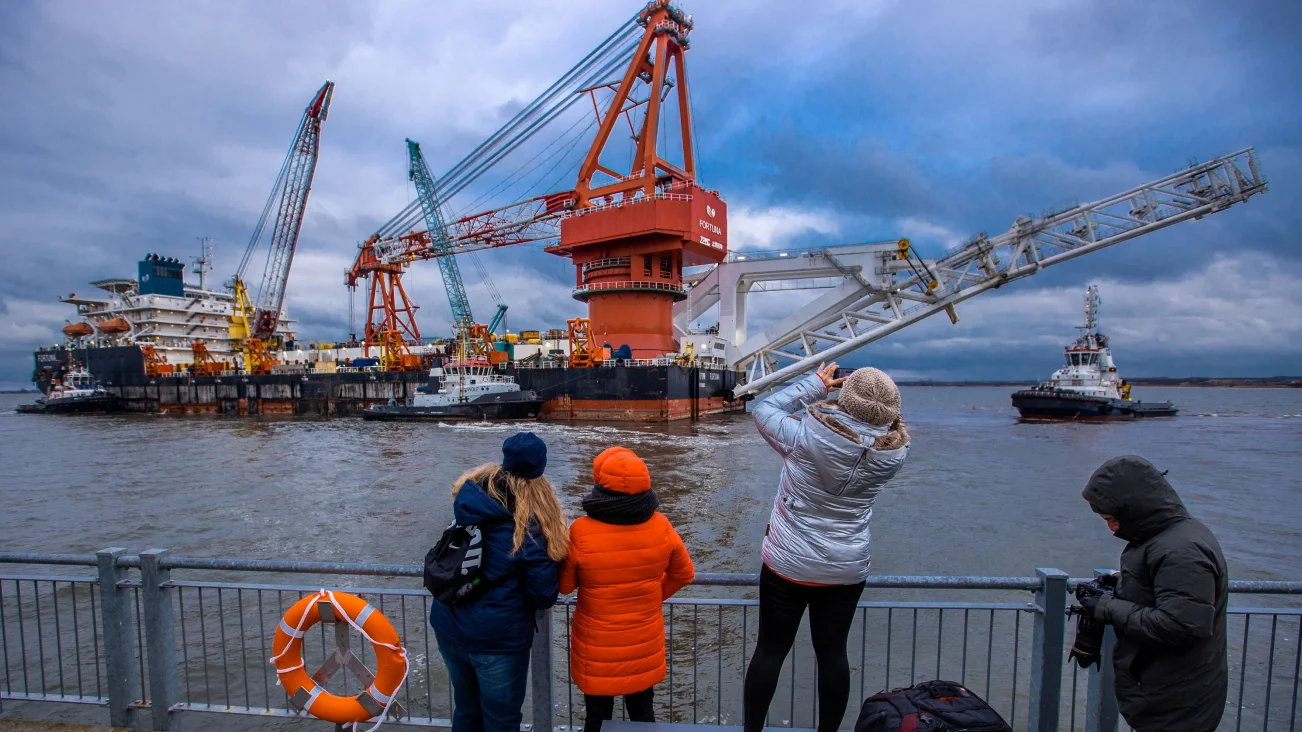
The new administration and the German government want to reestablish the close ties that existed in the pre-Trump era. If only the construction of this gas pipeline to Russia wasn’t happening.
Maybe it’s a coincidence. Maybe it isn’t. Shortly before President Joe Biden paid a virtual visit to Germany this past Friday to participate in the Munich Security Conference’s digital short version alongside Chancellor Angela Merkel, he received a letter. Two senators urged “dear President Biden” to retain a policy that was in effect during Donald Trump’s presidency. “The U.S. relationship with Germany is a cornerstone of the transatlantic alliance,” they emphasized. “But allowing the completion of Nord Stream II is not a constructive path forward for this partnership.” The most interesting aspect of this letter is who signed it. One of the undersigned is Jim Risch; the other is Jeanne Shaheen. Risch is a Republican, Shaheen is a Democrat.
This illustrates the Catch-22 Biden is facing regarding the gas pipeline, which has been a point of contention between Germany and the United States for quite some time. Biden and his secretary of state, Antony Blinken, made it clear how important they consider the improvement of relations with allies, Germany in particular, which suffered a great deal under Trump. However, the example of Nord Stream 2 shows how difficult this could prove to be in reality. In their letter, Risch and Shaheen insist on the “full implementation” of two pieces of legislation that threaten to impose sanctions regarding when the German-Russian pipeline is completed and in operation. “This is important legislation that was passed into law with strong bipartisan support during the 116th Congress,” the senators wrote.
Minister of Foreign Affairs Heiko Maas Warns against Hasty Decisions as Well
That means the more concessions Biden offers Germany, the more he risks endangering a rare Republican-Democrat consensus in Washington. In particular, Biden risks antagonizing his own Democrats. So far, it remains unclear what these concessions would even look like. Merkel, even after the arrest and conviction of the poisoned Russian opposition leader Alexei Navalny, stands by the project. Her opinion regarding Nord Stream 2 is “for now, unaffected,” she said recently. He who categorically rejects Nord Stream 2 must keep in mind the geostrategic implications “and what this means for Europe’s opportunities to influence Russia,” warned Heiko Maas of the Social Democratic Party of Germany.
So just carry on? This isn’t considered a realistic plan, either in government or within the coalition groups. The dilemma is evident. We must seize the chance for solidarity after years of taunting from Trump, but the pipeline cannot be canceled due to potential indemnification claims amounting to billions. “We have to actively seek talks,” said Nils Schmid, foreign affairs spokesman for the Social Democratic Party parliamentary group. “Things have to move,” demanded Norbert Röttgen, chairman of the Committee on Foreign Affairs and Christian Democratic Union presidium member. They both agree that Biden and Blinken are, at the very least, open to suggestions from Berlin.
This hope also rests on a book by Blinken: “Ally Versus Ally: America, Europe, and the Siberian Pipeline Crisis.” Blinken takes a look at a transatlantic crisis caused by the pipeline business, and advocates against pressuring Germany. However, the book was published in 1987 and is about one specific chapter of the Cold War. In Berlin, it’s seen as a sign that Blinken doesn’t want to pursue the United States’ plans for sanctions. Of course, he hasn’t announced that yet. To the contrary, he knows that Biden “would have us use every persuasive tool that we have to convince our friends and partners, including Germany, not to move forward with it,” he said said during his confirmation hearing in the Senate.
During the first talks between Maas and Blinken, the pipeline apparently wasn’t a main subject of conversation, which is seen as a good sign in Berlin. During the first major meeting, likely via video conference due to the pandemic, the issue will be addressed, however. This will show how resilient Washington’s signals regarding readiness to compromise actually are. Whether Biden and Blinken are willing to take risks pertaining to domestic policy and take back their threats regarding sanctions will likely depend on Germany making an interesting offer.
The parliament in Berlin has come up with some ideas. Leading foreign policy experts have already taken positions. For instance, Johann Wadephul, vice president of the German conservative parliamentary group, spoke out against a construction freeze. However, he did support a “shutdown device” that, for instance, would be used in case Russia cuts off Ukraine’s gas supply. His fellow party member Röttgen, an outspoken critic of the pipeline, is skeptical. “With this, we turn the pipeline into a political weapon,” he warned. A “European treaty regarding energy security,” also including the United States, would be more sensible. A “solution within the framework of the policy toward Russia” must be found, says SPD foreign policy specialist Schmid. He would like to see the implementation of a step-by-step plan. The United States put a hold on the sanctions. In return, the pipeline will be finished, but not yet operable until there is agreement on a common policy toward Russia.
Usually there is a suitable place for testing ideas like these: the hallways of the Munich Security Conference. However, the chances for making progress during the digital version of the conference held on Friday due to the pandemic were low.

Leave a Reply
You must be logged in to post a comment.